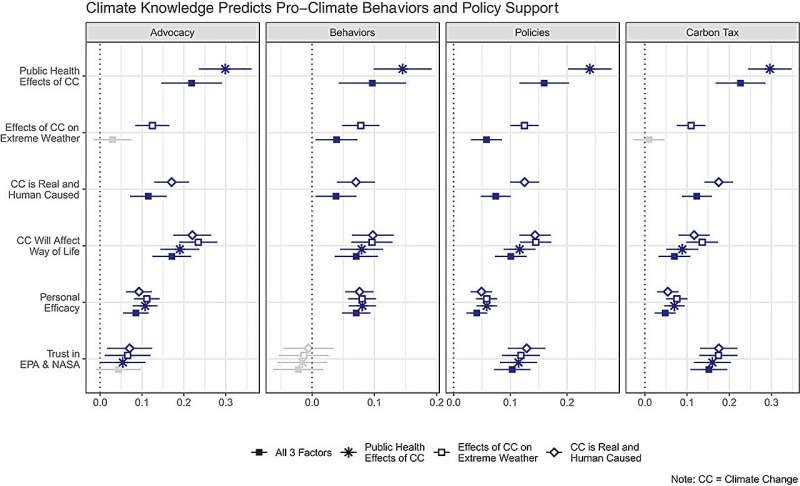This article has been reviewed according to Science X's and . have highlighted the following attributes while ensuring the content's credibility:
fact-checked
peer-reviewed publication
trusted source
proofread
Public health beliefs predict support for climate action, study shows

A paper in the current issue of the Journal of Health Communication by Annenberg Public Policy Center (APPC) researchers finds evidence that holding science-consistent beliefs about the public health effects of climate change is an important predictor of support for policies that address climate threats.
In "Science-Consistent Climate Health Beliefs as Predictors of Climate Behaviors and Support for Inflation Reduction Act Provisions and a Carbon Emissions Tax," a research team from the Annenberg Public Policy Center of the University of Pennsylvania examined the relationship between health-related beliefs about climate change and support for climate policy proposals, as well as a willingness to advocate for climate policies and to report engaging in pro-climate behaviors.
The researchers found that science-consistent beliefs about the effects of climate change on public health predicted support for climate action, even after controlling for belief in the existence and cause of climate change.
"In this study, people who believe that these public health effects of climate change are real were more likely to support climate action, regardless of whether they said they believed that climate change is real and human-caused," said lead author Shawn Patterson Jr., a research analyst at APPC.
The public health dangers posed by climate change include increased water-borne illnesses, bug-borne diseases, effects on crops, and premature births, among others. The World Health Organization (WHO) estimates that climate change will cause about 250,000 additional deaths per year between 2030 and 2050 "from undernutrition, malaria, diarrhea and heat stress alone."
The finding that science-consistent beliefs about these health risks predicts support for climate action has important implications for messaging about climate change.
"This study provides additional evidence that belief grounded in science-consistent knowledge matters," said Kathleen Hall Jamieson, director of APPC and a co-author of the study.
In addition to Patterson and Jamieson, the study was co-authored by Patrick E. Jamieson, director of the Annenberg Health and Risk Communication Institute at APPC.
The data for the study were drawn from the Annenberg Science and Public Health (ASAPH) knowledge survey.
More information: Shawn Patterson et al, Science-Consistent Climate Health Beliefs As Predictors of Climate Behaviors and Support for Inflation Reduction Act Provisions and a Carbon Emissions Tax, Journal of Health Communication (2024).
Journal information: Journal of Health Communication

















